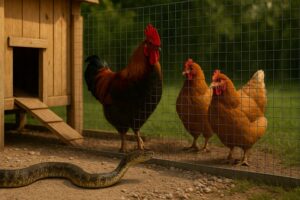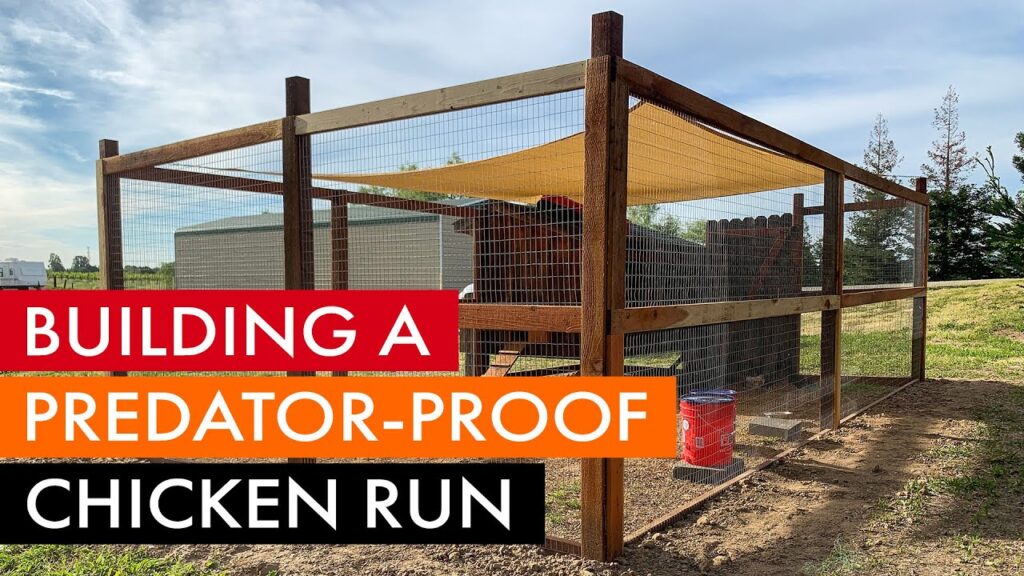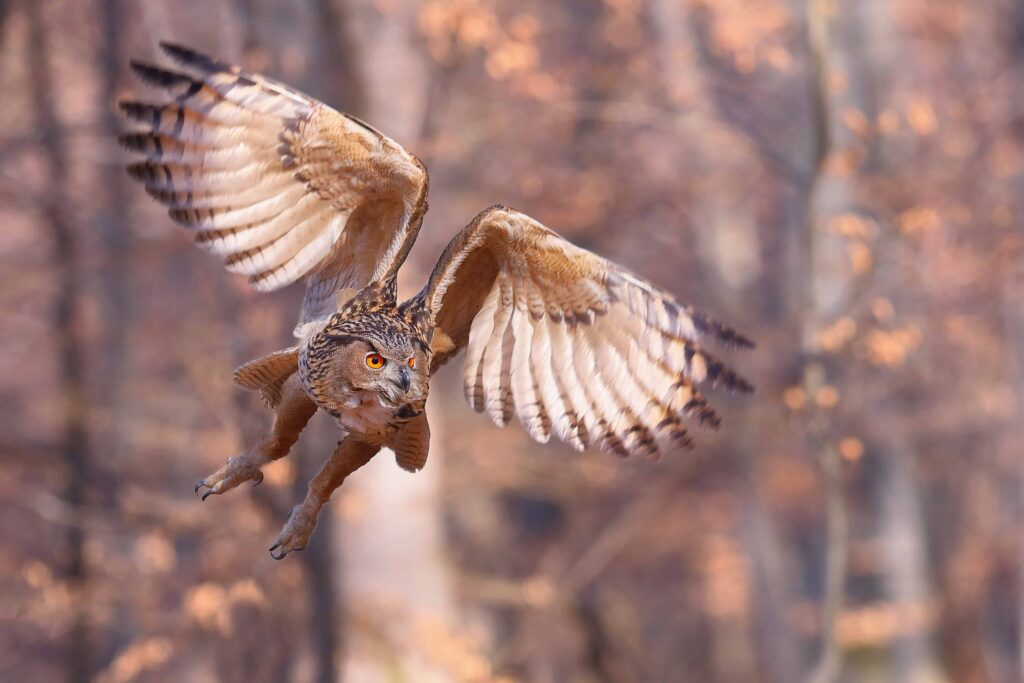Last updated on August 6, 2025
That heart-stopping moment you find a snakeskin near the coop, or worse, discover missing eggs, can send shivers down any chicken keeper’s spine. It’s a common concern, and the fear is real.
But here’s a reassuring truth: snakes are usually after easy meals like rodents and eggs, not your adult chickens. Understanding this shifts the battle from fear to strategy, empowering you to protect your flock effectively.
This guide provides a comprehensive, step-by-step plan on how to protect chickens from snakes, transforming your chicken coop into a fortress against them. While some specific snake examples are drawn from a Nigerian context, the core principles and practical steps are universally applicable to chicken keepers around the globe.





You can learn more about general predator protection on our Chicken Predators & Protection pillar page.
Why Snakes Are Attracted to Your Chicken Coop (Know Your Enemy)
To effectively keep snakes away, you need to understand what draws them in. It’s rarely a direct desire for your feathered friends themselves. Instead, your coop offers a tempting buffet.
It’s Not the Chickens, It’s the Food:
Snakes are primarily drawn to your coop by the promise of an easy meal. This often means rodents (mice and rats) that are attracted to spilled chicken feed, the readily available eggs, and occasionally, vulnerable chicks.
I once had a persistent rat problem in my feed shed, and within a week, I started seeing rat snakes near the coop. It wasn’t until I sealed up the feed and trapped the rats that the snakes disappeared. They were just following their dinner! This experience truly showed me how to keep snakes away by cutting off their food source.
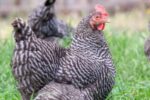

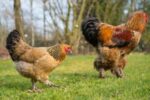

While they can sense the general presence and warmth of animals, the question “Can snakes smell chickens?” is better answered by understanding they’re more likely drawn to the scent of the rodents that feast on your spilled feed, or the general activity and warmth of a bustling coop. Their excellent sense of smell helps them track these primary food sources.
As Liz Black, a Poultry Extension Specialist at LSU AgCenter, notes, “Sometimes the snakes follow rodents into the chicken coop because they are consuming the available chicken feed. Once inside they not only find a meal on rodents but discover eggs as a food source.” (Source: LSU AgCenter, “Snake Issues in Poultry Housing”)
Common Culprit Snakes in Nigeria (and how to find yours):
In Nigeria, several snake species might be found near chicken coops, often seeking rodents or eggs. Common non-venomous egg-eaters include some species of house snakes (e.g., Boaedon fuliginosus) and various grass snakes.
These are typically harmless to adult chickens but a threat to eggs and chicks. While less common to target coops specifically, larger constrictors like the African Rock Python (Python sebae) are a much more significant threat due to their size and ability to consume adult chickens.




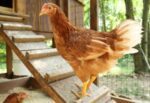
Knowing your local common species can help you understand their typical behaviors and assess the level of threat. For readers outside Nigeria, we highly recommend researching the common snake species in your specific region that are known to prey on eggs or rodents. Your local university extension office or wildlife authority is a great resource for this information.
How to Make a Chicken Coop Snake-Proof: Fortifying Your Flock’s Home
Making your chicken coop truly snake-proof is the single most critical step you can take in how to protect chickens from snakes. This section directly answers: How do you make a chicken coop snake proof?
The #1 Most Important Material: Hardware Cloth
When it comes to keeping snakes out, forget chicken wire. It’s absolutely useless against snakes, as they can easily squeeze through its wide openings. I’ve seen countless new chicken keepers make this mistake, only to discover a snake curled up in a nesting box.
The gold standard for snake proof chicken wire is 1/4-inch hardware cloth. This material is a tightly woven, galvanized mesh that even the smallest snakes struggle to penetrate.





If 1/4-inch is hard to find, 1/2-inch hardware cloth is a good alternative, offering significant protection against most common egg-eating snakes. This is truly the best protector for chickens against slithering intruders.
As the experts at Backyard Oasis emphasize, “Chicken wire seems sturdy, but it’s too flimsy to withstand snakes. They can easily push through or create gaps. 1/4 inch hardware cloth is too small for snakes to squeeze through. Its rigid welded design also holds up to force. Use this material instead of chicken wire on coop walls, ceilings, doors – you name it.” (Source: Backyard Oasis, “How to Keep Snakes Out of Your Chicken Coop: 9 Easy Tips”)
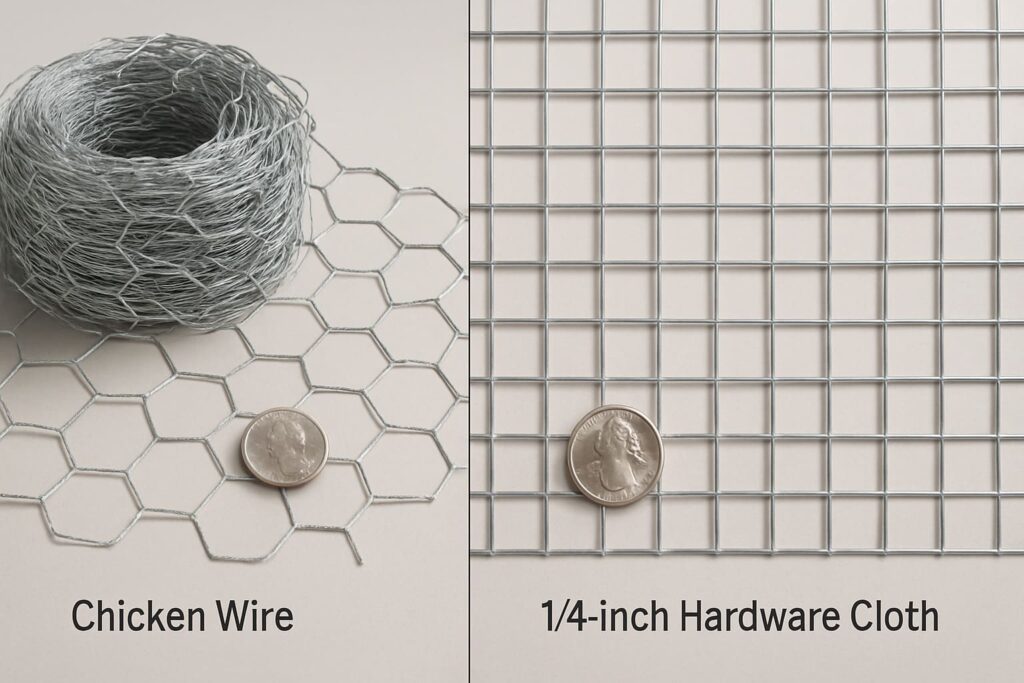
A Step-by-Step Fortification Checklist:
Use this checklist to ensure your coop is a secure haven. Think of it as building layers of defense.
- Cover All Openings: Every single opening, no matter how tiny, needs to be covered with 1/4-inch hardware cloth. Inspect vents, windows, and any gaps or cracks. If your pinky finger fits, a snake can too.
- Secure the Floor: Opt for concrete floors if possible. For dirt floors, implement extra precautions to prevent burrowing.
- Create a Buried “Apron”: Bury hardware cloth 12 inches deep around the perimeter, extending it outwards horizontally for another 12 inches. This stops digging predators and burrowing snakes. (Image: A photo showing a chicken coop with a buried hardware cloth “aprone” around its base)
- Elevate the Coop: Raise your coop 12-18 inches off the ground to make access harder for snakes and eliminate hiding spots underneath.
- Use Secure Latches: Install predator-proof latches on all doors and access points to prevent other animals from creating openings that snakes can exploit.
For more detailed instructions on securing your coop, check out our guide on DIY Predator Proof Your Chicken Coop.



How to Keep Snakes Away: Practical Steps to Protect Chickens from Snakes
Beyond fortifying the coop itself, managing your property’s environment is key to answering: How do you keep snakes away from your chickens? You want to make your entire yard a place snakes don’t want to be.
Implementing these environmental management strategies is a proactive and effective way to protect your chickens from snakes.
Eliminate Their Shelter:
Snakes love to hide in cool, dark, secluded spots. By removing these havens, you make your property far less appealing.
- Mowing tall grass regularly, especially within a 20-foot radius of the coop. Snakes use tall grass for cover and hunting.
- Removing woodpiles, rock piles, debris, overgrown bushes, and junk near the coop. These are prime snake hiding spots. If you have a woodpile, keep it as far from the coop as possible and elevate it.
- Keeping the coop’s immediate surroundings tidy and clutter-free. A clean yard offers fewer places for snakes to feel safe.
Cut Off the Rodent Buffet:
This is a critical point: rodent control is snake control. If you eliminate the primary food source for snakes, they’ll have no reason to stick around your coop.



As the team at Backyard Oasis succinctly puts it, “Snakes slither after rodents, so your coop’s mice and rat population acts like an all-you-can-eat buffet sign for snakes. Controlling pests equals fewer snakes.” (Source: Backyard Oasis, “How to Keep Snakes Out of Your Chicken Coop: 9 Easy Tips”)
- Use rodent-proof feeders that minimize spilled feed. Hanging feeders or treadle feeders can drastically reduce spillage.
- Store all chicken feed in sturdy, airtight metal cans with secure lids. Plastic bins can be chewed through by determined rodents.
- Clean up any spilled feed immediately. Don’t leave a buffet out for mice and rats, which in turn attracts snakes.
- Consider using automated feeders to reduce spillage; you can find more information in our article on Automated Poultry Feeders.
What Smell Keeps Snakes Away? Natural Repellents:
Many chicken keepers wonder about the best snake repellent for chicken coops. While no repellent is a magical force field, some natural options can act as deterrents by making the area less pleasant for snakes. This answers the question: What smell keeps snakes away?
- Plants known to deter snakes: Consider planting strong-smelling plants like marigolds, lemongrass, garlic, and onions around your coop’s perimeter. The strong odors are thought to be unpleasant to snakes, encouraging them to go elsewhere.
- Garlic/Onion Spray Recipe: You can create a simple, non-toxic spray: blend a few cloves of garlic or a chopped onion with water, strain the liquid, and spray it around the coop perimeter and known snake entry points. Reapply after rain.
It’s important to be realistic about the effectiveness of natural repellents. They are deterrents, not impenetrable barriers. They work best as part of a multi-pronged approach.
As stated by Nutrena Feeds, “There is no specific snake repellant that works nor is there a device that will magically keep snakes away, though many companies trying to sell products want you to believe that. The best way to keep snakes away is prevention.” (Source: Nutrena Feeds, “5 Tips To Keep Snakes Away From Chicken Coops”) Commercial repellents, especially those containing sulfur or mothballs, have disputed effectiveness and can be harmful to your chickens and the environment. Always prioritize physical barriers and habitat management over chemical solutions.




Guardian Animals That Help Keep Snakes Away
Can other animals help protect your flock? This section explores: What animals keep snakes away? While these animals can offer an additional layer of defense, it’s crucial to understand their limitations and benefits to make an informed decision for your flock’s safety.
Guinea Hens: The Noisy Watchdogs:
Guinea hens are renowned for their loud alarm calls, making them excellent early warning systems. They will squawk incessantly at anything unusual, including snakes.
Their noisy presence and tendency to mob perceived threats can certainly deter smaller snakes, often driving them away before they get too close to the coop. This is why many ask, “Guinea hens keep snakes away?”
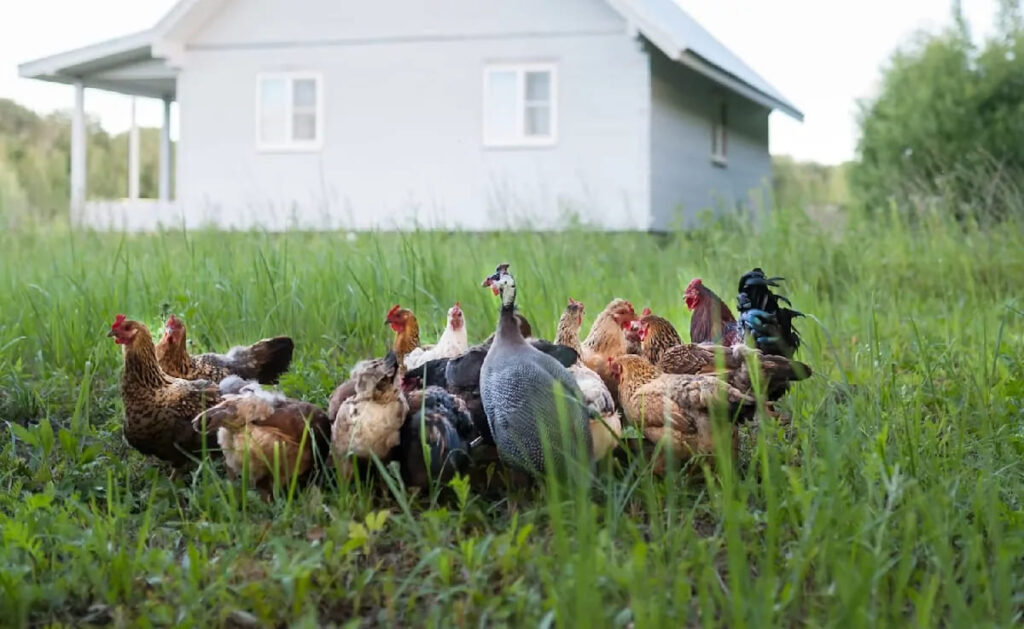
- Pros: Excellent alarm system, can deter smaller snakes, and may alert you to other predators.
- Cons: Very noisy (can annoy neighbors), tend to roam far from the coop, and aren’t effective against larger, determined, or venomous snakes. Their mobbing behavior might not be enough to deter a large python or a swift, dangerous species.
Farm Cats and Dogs:
- Farm Cats: Their primary role in snake deterrence is through rodent control. A good barn cat will keep the mouse and rat population down, thereby removing a major snake attractant. No rodents, no snake buffet.
- Dogs: While not specifically snake hunters, a watchful dog (especially a breed with a strong guarding instinct) can act as a general deterrent to most predators, including snakes, simply by its presence, barking, and scent. They can also alert you to unusual activity.
What to Do for a Chicken Bitten by a Snake: Emergency Response
The following is for informational purposes only and is not a substitute for professional veterinary care. If you suspect a venomous snakebite, contact a vet immediately. Your vet is the best resource for proper diagnosis and treatment on how to treat chicken bitten by snakes.

Identifying the Bite: Venomous vs. Non-Venomous
Knowing the signs can help you act quickly, but always err on the side of caution.
- Signs of a Potential Venomous Bite:
- Rapid and severe swelling: The area around the bite may swell quickly and dramatically.
- Distinct puncture marks: Often one or two clear, deep fang marks.
- Tissue discoloration: The skin around the bite might turn dark, bruised, or necrotic.
- Systemic symptoms: The chicken may show signs of severe pain, extreme lethargy, weakness, difficulty breathing, tremors, paralysis, or collapse. These symptoms can appear quickly or develop over several hours.
- Visible snake: If you saw the snake and know it was venomous.
- Signs of a Potential Non-Venomous Bite:
- Minor swelling: Less pronounced and slower to develop compared to venomous bites.
- Multiple small nicks or scratches: From rows of teeth, rather relevant to distinct punctures.
- Localized pain: The chicken might favor the limb or area, but general systemic distress is usually absent.
- Normal behavior: The chicken generally remains alert and active, though it might be a bit stressed.
Immediate First Aid Steps:
If you suspect a snakebite, time is of the essence, especially for venomous encounters.
- Isolate the bird immediately: Gently separate the bitten chicken from the rest of the flock. This prevents further stress to the injured bird and allows you to observe it closely without interference. A quiet, dark space can help reduce stress.
- Keep the bird calm and still: Movement can potentially spread venom more quickly. Minimize handling and encourage the chicken to rest.
- Do NOT attempt to cut or suck out venom: This is ineffective and can cause more harm, including infection, to both the chicken and yourself.
- Do NOT apply a tourniquet: This can cause tissue damage and is generally not recommended for snakebites.
- Clean the wound (if safe and non-venomous suspected): If you are absolutely certain it’s a non-venomous bite, gently clean the wound with mild soap and water or a diluted antiseptic solution (like povidone-iodine or chlorhexidine). This helps prevent secondary infection.
- Provide supportive care: Offer clean, fresh water within easy reach. Ensure the bird has a comfortable, warm, and quiet space away from noise and activity.
When to Call a Vet: Crucial Urgency
- Immediately for ANY suspected venomous bite: Rapid veterinary intervention is critical for survival. Even if you’re unsure, it’s always best to contact a vet at once. Describe the symptoms, and if possible, describe the snake (size, color, markings) without putting yourself in danger.
- If the bite seems to be causing significant pain, infection, or the chicken’s condition worsens: Even for non-venomous bites, complications like infection can arise. If you see signs of worsening health (e.g., increased swelling, pus, continued lethargy, loss of appetite), seek veterinary attention promptly.
Frequently Asked Questions (FAQ)
Q1: Do chickens attack snakes?
A: Sometimes, yes, but it’s not a reliable defense. Chickens, especially roosters or a group of hens, can mob and even kill smaller, non-venomous snakes. They might peck at them or try to stomp them. However, it’s not a reliable defense against larger or venomous snakes, and you shouldn’t rely on your chickens for snake control. A large python or a venomous cobra could easily overpower a chicken.
Q2: What is the single best method to keep snakes away?
A: There is no single “best” method. The most effective strategy is a multi-layered approach that combines a physically secure coop (using 1/4-inch hardware cloth on all openings and a buried apron) with comprehensive environmental management (rigorous rodent control and eliminating all potential hiding spots around your property). Neglecting one area can undermine your efforts in another. This is the best method to keep snakes away.
Q3: Where can I find a snake-proof chicken coop for sale?
A: When looking for a snake proof chicken coop for sale, prioritize specific features over brand names. It must be constructed with 1/4-inch hardware cloth (not flimsy chicken wire) on all openings, be elevated off the ground, and have secure, predator-proof latches on all doors. Always inspect the materials and construction carefully, and don’t hesitate to ask the seller about the mesh size used and how the floor is secured. Many “predator-proof” coops on the market are not truly snake-proof.
Q4: Is chicken wire effective against snakes?
A: No, chicken wire is not effective against snakes. Its openings are too large, allowing snakes to easily squeeze through. Always use 1/4-inch hardware cloth for snake-proofing.
Q5: How often should I collect eggs to deter snakes?
A: Collect eggs at least once per day, and ideally twice a day, to minimize the scent and presence of this easy food source that attracts snakes.
Q6: Do snakes always eat chickens, or just eggs?
A: Most snakes found in coops are after eggs and rodents. While larger constrictors can eat chickens, it’s less common for smaller, non-venomous species to prey on adult birds.
Q7: What are the primary attractants for snakes to a chicken coop?
A: Snakes are primarily drawn to coops by the presence of rodents (attracted to spilled feed), eggs, and occasionally, young chicks.
Q8: Can natural smells like garlic truly repel snakes?
A: Natural smells like garlic can act as deterrents, making an area less appealing to snakes. However, they are not foolproof barriers and work best as part of a multi-layered approach.
Q9: What should I do if I find a snake in my chicken coop?
A: Remain calm. If it’s a non-venomous snake, you can often gently encourage it to leave. For venomous snakes or if you’re unsure, contact a local wildlife removal service or animal control.
Conclusion
How to protect chickens from snakes doesn’t have to be an overwhelming task. By focusing on key preventative steps—primarily fortifying your coop with 1/4-inch hardware cloth, implementing rigorous rodent control, and eliminating potential hiding spots around your property—you can significantly reduce the risk of snake encounters and ensure your flock’s safety.
By taking these preventative steps, you can have peace of mind knowing your flock is safe and secure. What are your best tips for keeping snakes away from the coop? Share your experience in the comments below! We’d love to hear your success stories and practical advice.
